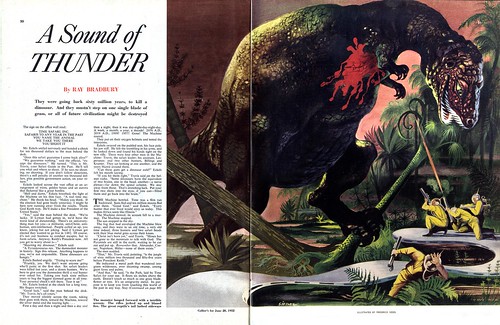I've been a avid reader since I was two. I have a condition called Hyperlexia, which is basically means I have a mind structured towards reading and writing. It's pretty much the opposite of Dyslexia, which is a inability to read or write. So yeah, I've been reading books since I was two. Not picture books mind you. I was reading Lord of the Rings when I was three, and I watched Carl Sagan's Cosmos before I was even into stuff like Bob the Builder (or whatever kids are watching today- I'm in my twenties...so, yeah). But one of my favourite authors has always been Isaac Asimov. I started reading classic, Golden-Age Sci Fi when I was four, and got hooked instantly. I didn't get that much into Star Trek, Star Wars and other stuff till I was about six, though I had watched episodes before then and liked them. But Asimov remains one of my guilty pleasures. Until recently, I had a copy of 'Robot Dreams' that I got from my dad that was signed by Asimov himself. Unfortunately, a recent house fire burned my copy, as well as about four bookcases of other sci fi classics. If anyone is interested, I can offer you a pile of ash that could possibly be the book that had Asimov's signature in it.
But ignoring my recent bad luck, I'd like to talk about the inspiration that Asimov and his writing had on me. Immediately after reading those stories at the age of four, I decided that when I grew up I would go to uni and become a mechatronics engineer. Two decades later, I'm currently doing my masters in Mechatronic Engineering, majoring in Space Robotics. Those books changed my life. As did those by Arthur C. Clarke, Robert Heinlein, Ray Bradbury and all those authors who layed the foundations of sci fi. I mean, look at what concepts we wouldn't have without them, or rather which ones are attributed to them:
- Robots as humanity's helpers, not their overlords (Isaac Asimov's Robot Saga)
- Power Armour (Robert Heinlein's Starship Troopers)
- Seed Ships (Arthur C Clarke's Rendezvous with Rama)
- Positronic Brains (Isaac Asimov's Robot Saga)
- CAD (Robert Heinlein's The Door Into Summer)
Tldr, has anyone here had their lives changed by Golden Age Sci fi, or been inspired by it in any way?
But ignoring my recent bad luck, I'd like to talk about the inspiration that Asimov and his writing had on me. Immediately after reading those stories at the age of four, I decided that when I grew up I would go to uni and become a mechatronics engineer. Two decades later, I'm currently doing my masters in Mechatronic Engineering, majoring in Space Robotics. Those books changed my life. As did those by Arthur C. Clarke, Robert Heinlein, Ray Bradbury and all those authors who layed the foundations of sci fi. I mean, look at what concepts we wouldn't have without them, or rather which ones are attributed to them:
- Robots as humanity's helpers, not their overlords (Isaac Asimov's Robot Saga)
- Power Armour (Robert Heinlein's Starship Troopers)
- Seed Ships (Arthur C Clarke's Rendezvous with Rama)
- Positronic Brains (Isaac Asimov's Robot Saga)
- CAD (Robert Heinlein's The Door Into Summer)
Tldr, has anyone here had their lives changed by Golden Age Sci fi, or been inspired by it in any way?







